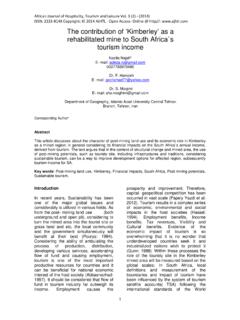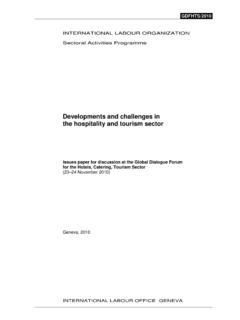Transcription of The impact of social media: advantages or disadvantages
1 African Journal of Hospitality, tourism and Leisure Vol. 4 (2) - (2015) ISSN: 2223-814X Copyright: 2014 AJHTL - Open Access- Online @ http//: The impact of social media: advantages or disadvantages Prof. van der Bank Faculty of Human Sciences Vaal University of Technology, South Africa Tel: 015 950 9240 Email: and Marjon van der Bank Lecturer: Legal Sciences Vaal University of Technology Abstract The role and use of social media in travellers decision making and tourism operations and management are widely discussed. The strategic importance of social media are high for tourism competitiveness. Slow progress are made by the industry in responding to business opportunities by social media. The online world is rapidly evolving and some companies may embrace new technologies due to the pressure to be digital but are not thinking about what it means to the business in a virtual environment.
2 Theoretically, the increasing significance and attention of social media in tourism was coined as the growing number of articles was found over the past are some challenges of intellectual property and data control for the development and dissemination of social -media-sources-involved. The phenomenon of social networking and the development of social media (web-based and mobile technologies that turn text communications into active dialog) has been the most dramatic development in the information age over recent Journalists (individuals who tweet opinions and comments on the internet for others to see) need to be aware that they could be subject to law suits. Keywords: social media, consumers, tourism , intellectual property and communication Source: African Journal of Hospitality, tourism and Leisure Vol.
3 4 (2) - (2015) ISSN: 2223-814X Copyright: 2014 AJHTL - Open Access- Online @ http//: Introduction social media and are two popular buzzwords as well as technological concepts, which have brought about persuasive changes in business-to-business communication, business-to-customer communication, and customer-to-customer communication (Kietzmann, Hermkens, McCarthy and Silvestre, 2011). The aim of this article, as shown in Figure 1, is to show the current state of the art of the studies of social media applied to the tourism sector with the main objective of providing a solid academic foundation on which to base the intention to develop practical application: a model based on innovation, which involves the application of a new marketing method, significant changes in product design positioning and promotion, which allows a better way to meet consumer needs, to open new markets or to position tourist products in a new way attracting more visitors to consume in a tourism way a destination.
4 Fig. 1. Research Scheme. To develop the state of the art model we have followed several lines of research: 1. Firstly, one focused on the competitiveness, innovation and social networks of the tourism industry as a source of innovation. 2. Secondly, we have identified the factors, variables and characteristics that define the so-called e-tourist, focused on the study of the traveller life cycle. 3. Finally, the consideration of current tourism as a tourism experience focused on experiential products, adding the experience as a fourth economic value added to services as once this were added to products and they themselves were added to inputs.
5 After setting up the conceptual framework, we have developed a theoretical model whose practical application has been adapted to various products and tourism businesses to verify the results of the model, and where it is possible to improve it. Competitiveness, Innovation and social Media The development of the model is based essentially on the concepts of causes and dynamics of competitiveness in the implementation of these concepts to the tourism industry we have considered some of the peculiarities that characterise tourism , specially, the intangibility of the services offered, the increasing information content and the interdependence between different State of the art Practical application Implementation Results Competitiveness, social media Analysis of e-tourists Experiential tourism development of a management model based on social media as a source of innovation Adapting the model to various products.
6 Business and tourist destinations Analysis of results and impacts and proposals African Journal of Hospitality, tourism and Leisure Vol. 4 (2) - (2015) ISSN: 2223-814X Copyright: 2014 AJHTL - Open Access- Online @ http//: companies or organizations involved to provide unique product or service. Driven by user-generated content-including the ability to share photos, videos, and comments with other readers-academic scholars also noted the capacity of social media in helping tourism and hospitality companies to engage potential guests, increase their online presence, and thereby lead to greater online revenues. Wang and Fesenmaier (2004) illustrated that social media are useful for managing customer relations with their unique ability of attracting customers through in-depth, focused, and member-generated content, engaging customers through social interactions, and retaining customers through relation building with other members who are online.
7 The authors considered the development of a model in the following concepts: 1. In the current situation, companies and organizations must compete in a global environment by supporting themselves on the international networking and responding simultaneously to local demand. 2. Competitiveness is based on the capacity of being updated, o the flexibility and the innovation of organizations, companies and destinations. 3. Innovation applied to tourism , given the specificities discussed above, involves a mix of changes in the product, the distribution, the marketing and even business organization or destinations. More than thirty percent of South Africans connect to the internet every day, making the environment one of the main sources of information and a great influence in making purchasing decisions, as well as establishing it as a major mean of interpersonal contact ( ).
8 Internet and New Consumer Habits in the tourism Sector One of the habits that is steadily growing in our society, which was essentially unthinkable years ago, is purchasing over the Internet and, interestingly, services related to tourism and Leisure are those that are the most demanded. Surveys showed that while on the Internet, buyers buy tickets (plane, train, boat, bus, etc.), some purchase hosting services and others services related to leisure and spare time activities. As evidenced by the EGM data [8], the areas related to tourism and Leisure are no strangers to the Internet, but on the contrary, are one of the fastest sectors that have adapted their distribution channels and information to users who increasingly use the network.
9 There is a rapid growth and consolidation of Internet use when planning vacations especially in major tourist source markets. Internet accounts more facilities for the user in the process of organizing and purchasing your holiday. Tourists can avoid intermediaries and contact hotels directly through Internet. In addition, travel agents have also adapted and use the network as a marketing channel through its Web pages. In this sense, it is important to note that, by virtue of using the Internet, visitors do not arrive in South Africa without reservation, but the network opens a wide range of facilities for tourists to manage their bookings. The Internet plays an increasingly important role in the tourism value chain.
10 The Internet is a dynamic medium, so that users, companies and institutions must adapt and continually recycle. The Internet model that exists today has nothing to do with the one that existed five years ago. Five years from now we will certainly see one that has nothing to do with the current one. Despite the wide adoption of social media by both tourism consumers and suppliers in recent years (Chung and Buhalis, 2008; Leung, Lee and Law, 2011), the successful practice of manipulating and managing social media still remains largely unknown to practitioners and scholars. In view of the increasing importance of social media the African Journal of Hospitality, tourism and Leisure Vol.
















